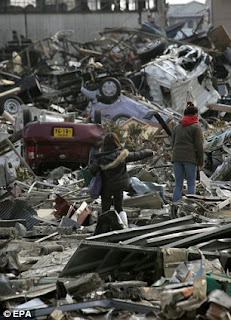* Men survive on crackers for breakfast and a can of meat for dinner
* Water is so scarce they wash hands in alcohol
* They sleep on lead-lined floor just 300 yards from the leaking plant
* Masks worn at all times, even to sleep
* Men's bedtime ritual is a synchronised clap and shout of 'Let's do our best'
They sleep - or at least try to - on a lead-lined floor just 300 yards from the leaking Fukushima nuclear power plant, huddling under a single blanket and surviving on tiny amounts of food and water.
The conditions are virtually intolerable, yet these are the men who hold much of Japan's immediate future in their hands, for if they fail to heal the crippled plant experts fear dangerous levels of radiation will pour out into the atmosphere and continue to spill into the sea.
They need more sleep, more warmth, more food, more water but finding drivers brave enough to bring in the daily necessities has become a hit and miss affair - and helicopters cannot be used because of the high levels of radiation around the nuclear complex.
Selfless: When at work, they breathe through respirators and dress in white protective clothing, which is not foolproof against some elements of the radiation
The first group of engineers and technicians who tried to tame the nuclear monster that began leaking radiation after the March 11 earthquake and tsunami were known as the Fukushima 50 - but since then the numbers have swelled to between 270 and 580 depending on the stresses each man can endure.
And the stresses come daily for these men whose breakfast is just emergency crackers and a small carton of vegetable juice, then nothing until dinner which consists of only rice and a can of chicken, mackerel or curry.
Each man is limited to 1.5 liters of water a day, resulting in them using alcohol instead of water to wash their hands. They cannot bathe and a change of clothing is rare.
Yesterday, it was revealed, high levels of irradiated water continued to find its way into the ocean from the plant - levels that were much higher than previously reported.
Japan's nuclear safety agency said radioactive iodine was as high as 3,355 times the legal limit and although government and nuclear experts say the iodine would have deteriorated considerably by the time it reached people, the task of stopping it pouring into the sea in the first place is what the courageous workers are facing.
They are sleeping in a 35-yard square office within an earthquake-resistant emergency building just a five minute walk from the No.1 reactor and because radiation levels outside are extremely high they have placed lead sheets on the floor.
Concerned about contamination in the air, the room cannot be ventilated and the workers must wear masks at all times, even indoors.
When at work, they breathe through respirators and dress in white protective clothing, which is not foolproof against some elements of the radiation.
Some of the weary engineers work at ways of preventing the water that is being blasted into the damaged reactors - to keep the fuel rods cool - from finding its way out again, highly contaminated, into the sea.
Others are racing to connect electric cables and repair damaged machinery so that the plant's cooling system can be restarted and a total meltdown avoided.
They can only work for an hour at a time, wherever they are in the plant, to avoid over-exposure to the radiation. The stress level, said Mr Kazuma Yokota, head of the nuclear safety agency's Fukushima office, is high.
And Professor Hirotada Hirose, a specialist in disaster and risk psychology said: 'This situation where they're not getting enough food or sleep will make them less efficient and increase the possibility of mistakes.' No-one, Japanese people agree in the restaurants, bars and homes of Tokyo, needs to hear about mistakes.
But the men who work together and sleep together on little sustenance are determined to fight through, holding a nightly ritual in which, with a synchronised clap, they shout: 'Let's do our best!'
Ground to a halt: A vast ship sits amid the rubble in Kesennuma, after the giant wave washed it ashore
Searching: A survivor walks along a cleared road in Natori, left, while a family in Ishinomaki search in vain where their home once stood






















0 comments:
Post a Comment